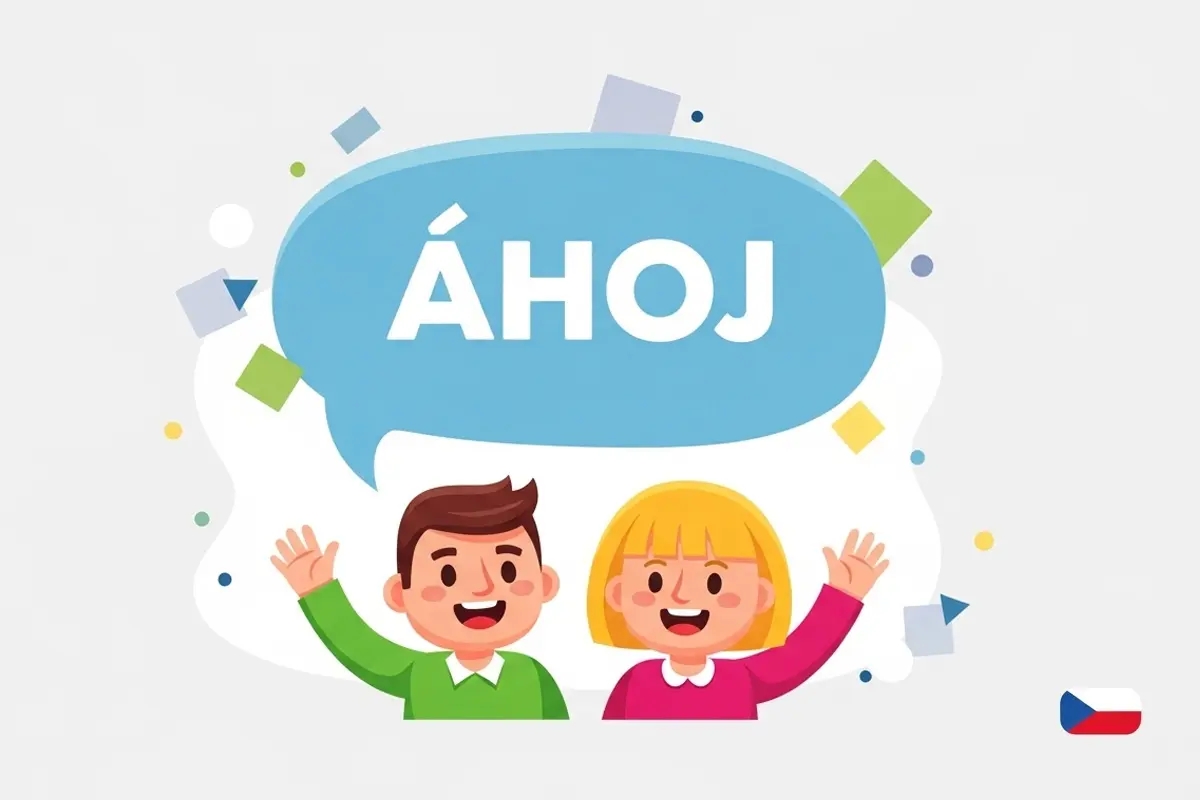
TL;DR
The most common way to say hello in Czech is “Dobrý den” (Good day) in formal contexts, and “Ahoj” (Hi) among friends. Other greetings include “Dobré ráno” (Good morning), “Dobrý večer” (Good evening), and “Čau” (Hi/Bye, informal). Learning when to use formal vs. informal greetings is key to sounding polite in the Czech Republic.
Introduction: How to Say Hello in Czech Language
If you’re searching for how to say hello in Czech language, the short answer is “Dobrý den”, literally “good day.” This polite greeting works in shops, offices, or when meeting someone new. Informally, Czechs say “Ahoj”, similar to “hi” in English. But greetings in Czech are more nuanced, reflecting cultural traditions, levels of formality, and even the time of day.
This guide breaks down every aspect of Czech greetings—formal vs. informal, regional usage, pronunciation, and cultural etiquette. By the end, you’ll know not just what words to say, but how to use them naturally in real Czech conversations.
Formal Greetings: “Dobrý den” and Beyond
In Czech society, formal greetings show respect. The most standard greeting is “Dobrý den” (Good day).
- Used from late morning until early evening.
- Works in professional settings, shops, restaurants, and first meetings.
Time-Specific Greetings
- Dobré ráno – Good morning (used until about 10 a.m.).
- Dobrý večer – Good evening (used after sunset).
- Dobrou noc – Good night (parting phrase, not for meeting).
Pronunciation Tips
- The ř sound in Czech is unique, combining an “r” and “zh” sound. Example: in Dobré ráno.
- Stress almost always falls on the first syllable in Czech words.
Table: Formal Greetings
| Czech Phrase | Meaning | When to Use |
|---|---|---|
| Dobrý den | Good day | General polite greeting |
| Dobré ráno | Good morning | Before ~10 a.m. |
| Dobrý večer | Good evening | After sunset |
| Dobrou noc | Good night | Saying goodbye at night |
According to CzechClass101, using the right greeting for the time of day signals both politeness and cultural awareness.
Informal Greetings: “Ahoj” and “Čau”
With friends, family, or peers, Czechs use more relaxed greetings.
- Ahoj! – Similar to “Hi!” or “Hello!” (informal, often used among equals).
- Čau! – Borrowed from Italian, means both “Hi!” and “Bye!” (informal).
These greetings are warm, but using them in the wrong context (e.g., with a boss or stranger) can feel disrespectful.
Ahoj is also used when addressing children or younger people. According to Locallingo’s Czech greetings guide , many Czechs switch fluidly between formal and informal greetings depending on context.
Greeting Etiquette in the Czech Republic
Czech greetings are about more than words—they reflect cultural values.
- Handshakes are common in formal settings.
- Use titles and last names until invited to use first names.
- In informal situations, greetings may be accompanied by a friendly nod or wave.
Learning when to use “Dobrý den” vs. “Ahoj” is essential. As Preply notes , misusing informal greetings can come across as impolite.
Regional and Generational Variations
Czech greetings can vary by region or age group:
- Younger people often prefer “Čau” or even English “Hi.”
- In Moravia, locals sometimes use warmer expressions like “Zdravím” (I greet you).
- Older generations expect more formal usage.
These differences mean that listening and adapting is crucial. Just as in Danish culture (see our guide on what language people speak in Denmark), greetings can act as markers of identity and politeness.
Comparing Czech Greetings with Other Languages
Czech greetings reflect broader Slavic traditions.
- Polish: “Dzień dobry” (Good day).
- Slovak: “Dobrý deň.”
- Russian: “Zdravstvuyte” (formal hello).
Czech also shares informal greetings like “Ahoj”, which exist in Slovak too. This overlap makes greetings easier for learners who know other Slavic languages.
For those exploring multiple languages, check out our post on basic words in Czech, which expands beyond greetings into everyday vocabulary.
Common Mistakes Learners Make
- Overusing “Ahoj” – Not suitable for strangers or formal settings.
- Ignoring time-of-day greetings – Saying “Dobrý den” at midnight feels odd.
- Mispronouncing “ř” – This sound requires practice.
- Forgetting cultural context – Titles matter in Czech introductions.
These mistakes are common among travelers, but with awareness, you can avoid them. As explained in Chapman University’s Czech phrases list , greetings are among the first signs of cultural competence.
Practical Scenarios: Greetings in Action
In a Shop
Customer: Dobrý den.
Shopkeeper: Dobrý den.
Meeting a Friend
Friend A: Ahoj!
Friend B: Čau!
In the Morning
Neighbor: Dobré ráno.
You: Dobré ráno.
Including these small exchanges helps learners hear greetings in authentic context. If you want to expand beyond greetings, you can explore our guide on basic words in Czech, which introduces everyday vocabulary that pairs well with greetings in real-life conversations.
FAQ: How to Say Hello in Czech Language
Q: What is the most common way to say hello in Czech?
A: “Dobrý den” is the standard formal greeting.
Q: Can I use “Ahoj” with strangers?
A: No, it’s reserved for friends, family, and equals.
Q: How do I say good morning in Czech?
A: “Dobré ráno.”
Q: Is “Čau” rude?
A: Not rude, but very informal. Use it with people you know well.
Conclusion
So, how to say hello in Czech language?
- Use “Dobrý den” for formal settings.
- Say “Ahoj” or “Čau” with friends.
- Adjust greetings based on time of day and level of familiarity.
By mastering Czech greetings, you not only learn words but also tap into the culture’s rhythm of respect and friendliness. And once you’re comfortable, you can explore more advanced Czech expressions with confidence.